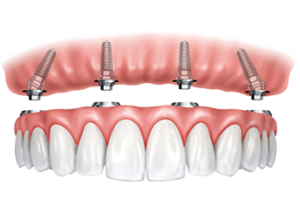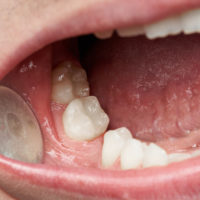- What Are Implant Dentures?
- Benefits of Implant Dentures
- Types of Implant Dentures
- The Implant Denture Procedure
- Implant Denture Cost
What Are Implant Dentures?

“Implant dentures” is a shortened term for implant-supported or implant-retained dentures. Put simply, they are dentures held in place by a connection to dental implants. The dental implants act as anchors in the jawbone and provide an interface for attachment to a denture, which contains prosthetic teeth replacing the entire upper or lower dental arch. Unlike traditional dentures, which rely on a suction effect and trained mouth muscles to stay in place, implant dentures rely on the attachment to the dental implants within the bone.
What Are the Pros of Implant Dentures?
Because implant dentures have an interlocking connection with the implants, they provide several benefits over traditional dentures.
- No embarrassing looseness when eating, speaking or laughing
- No clicking sounds when you talk
- Fewer sore spots
- Better chewing ability
- Shorter adjustment period
- Greater patient comfort
- Greater confidence in public eating, speaking, or laughing
What Are the Different Types of Implant Dentures?

Some implant dentures function via an attachment the patient can remove at any time for cleaning and rest for the gum tissues. Others are more permanently attached to the dental implants and removable only by your dentist for yearly cleaning and maintenance.
Implant-Supported Dentures
Implant-supported dentures use a traditional denture base with locator attachments embedded within the inner surface. These locators align with the implant abutments, and when pressed into place, they create a temporary locking. Think of snaps on a shirt. They are removable, but in general, they will remain attached throughout normal function.
These dentures are stable, without looseness or moving around. Patients remove them every night for cleaning and “rest” for the gums.
All-on-4 and All-on-6
Both of these terms refer to a dental prosthesis replacing all of the upper or lower teeth that the dentist attaches to either four or six dental implants in the bone. The size, quality, and location of necessary jawbone is what determines the number of implants that will best support a full arch prosthesis. Regardless of how many dental implants are supporting the prosthesis, the result is a secure, cosmetic restoration of all missing teeth.
Your dentist attaches All-on-4 and All-on-6 restorations to the underlying dental implants, and the patient is not able to remove them. They require yearly removal for cleaning and maintenance, so patients with All-on-4 and All-on-6 typically see the dentist once every year.
Full Mouth Restoration
Full mouth restoration with dental implants is another treatment option for someone missing an entire arch of teeth. The difference between full mouth restoration and all-on-X is that a full mouth restoration can include multiple restorations to replace the missing teeth, whereas all-on-X replaces missing teeth with a single prosthesis. For example, full mouth restoration might involve eight dental implants and four dental bridges with three “teeth” each.
Your dentist cements full mouth restorations onto the dental implants, so they are not removable. Patients clean and maintain them with traditional brushing and flossing, as well as additional oral hygiene tools to help reach the unique features of implant restoration.
How Is the Implant Dentures Procedure Performed?
The different types of implant dentures require very different procedures. They all include a surgical phase, in which the implants are placed into the jawbone. In some cases, the patient begins wearing the final prosthesis immediately, and in others, a temporary denture is necessary. Our dentists work closely with the highest-quality dental labs to create the most natural and comfortable implant denture for each patient.
How Much Do Implant Dentures Cost?
Again, due to the very different procedures involved in the different types of implant dentures, the cost ranges widely!
In general, the least expensive option is an implant-supported denture, and the most expensive option is full mouth restoration with multiple dental implants. For a single arch (either all the upper teeth or all the lower teeth), the cost ranges from $3,000 to $25,000 with possibilities everywhere in between.
More important than the specific fee for the implants and prosthetics is the experience and education of the treating dentist. Our doctors have hundreds of hours of education and experience in dental implants above and beyond that of the average dentist.


